The name of the SEO game has changed so much since I started in the industry.
Driven by sales made on social media and social ecommerce booming earlier than expected, along with businesses wanting to bulk up their online presence, search volumes have increased tremendously over the years.
These days, Google processes over 100,000 searches per second, every day. Chances are, people are looking for all types of businesses, from a digital marketing agency to the newest brunch spot in their area.
Users are demanding relevant content. So, keywords play a critical role in your page rank.
While a steady stream of relevant content is helpful to your audience, keyword cannibalization could threaten your content’s performance.
You don’t want to weaken your content production engine by having a weak SEO keyword strategy or focusing too much on the same topics.
The words you choose will dictate not only who will see your content, but how it performs. If you’re consistently adding to your site, you may need an audit. This is important so you don’t showcase similar topics, causing keyword cannibalization.
Is your content taking a bite out of your chances for high-ranking opportunities?
You can’t have your high Google rank and eat it too.
So, don’t make this big SEO mistake.
Let’s break down why keyword cannibalization is harmful to your site and how I can help you fix it with the right tool.
What Is Keyword Cannibalization?
Believe it or not, this is a common problem with SEO.
Having multiple pages on your website optimized for the same or similar search query can result in all pages ranking poorly.
Keyword cannibalization is when you become your own competition for the top-ranking position, but this isn’t a good thing.
These pages are eating away at each other’s organic performance, hurting your search rankings.
The issue of keyword cannibalization confuses search engines as well as users.
You’ll need to switch up your SEO keyword strategy to not lose page authority, slate your relevant pages, or waste your crawl budget.
If this term doesn’t sound familiar to you, check out my explanation on “what is keyword cannibalization?” to sharpen your keyword strategy.
What Do Site Owners Get Wrong With Keyword Strategies That Leads to Keyword Cannibalization?
After laying the foundation for your online presence, you may find issues with your content and your SEO keyword strategy. With so much content, you’re bound to cover topics more than once.
For example, WP Engine has multiple content categories, but by using keywords to shape or refresh their content, they can avoid cannibalization issues.

To avoid SEO missteps, figure out how to avoid keyword cannibalization.
It’s likely to be resolved by reimagining your keyword strategy. Even if you’re a new brand, it is good to keep this practice in mind.
Don’t feel bad about this happening on your site.
Targeting similar keywords on multiple pages will reveal the flaw to this formula – and may even cost you your page rank. So, what goes wrong in a keyword strategy to lead to this?
Not Having a Targeted Keyword Strategy
Simply put: a targeted keyword strategy is the steps taken to find keywords in your research, content planned based on those keywords, and tracking of the keywords’ results.
How you target those keywords is what’s important. So, I suggest you look into keywords in relation to your product and what your competitors are doing for more opportunity.
Your insights from these results show how you make informed decisions with your efforts.
Don’t ruin your chances for potential leads by not having a targeted keyword strategy.
If you’re just getting started or conducting an SEO audit, creating your keyword strategy will be a good start to organizing search marketing tactics.
After all, being accessible in the SERPs is what will be valuable and profitable to your brand.
Not Having Keyword Tracking in Place
Choosing the right SEO keywords to optimize is key, but how will you know which words or phrases to pick without a plan?
I recommend you get an actionable flow going.
Start with monitoring the rankings of your site and your competitors on a daily to weekly basis. Active keyword tracking lets you see where your competitors are having success and if you’re missing out on potential opportunities. You can see the below example of how this looks on Ubersuggest.
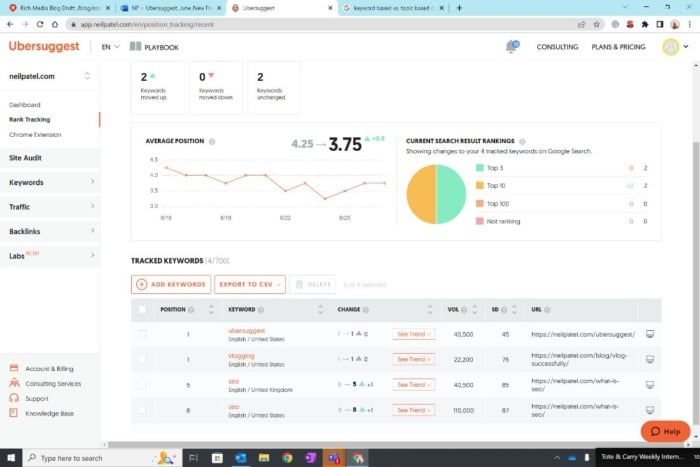
Knowing this information, you can make informed movements to maintain performance and outrank the competition for target keywords.
With an understanding of your competition, you can increase your visibility as well. Having a share of voice on your target keywords will reveal which keywords are the right fit for you.
You will then increase client visibility of your content. However, this isn’t our only goal.
Once you’re tracking your keyword position regularly, you can measure SEO or PPC efforts. This will extend your lens of overall visibility to pinpoint customer defining keywords.
Getting this detail-oriented with keyword tracking will help you analyze search intent. This step will save your content marketing efforts because you won’t be “getting lucky.”
Analytics will show you why people search for certain keywords, so you don’t have to guess.
Conducting these searches on Google will show you the intent behind the search, and why it’s relevant to your products, services, or content.
Building Content Around Keywords, Not Topics
No more guessing means you can build content around keywords and not topics.
Expanding from a keyword is what will make your SEO keyword strategy tactical. Content based on topics may not be what your audience wants. Remember to watch the metrics to see the response to keywords in your content.
Topics can keep your content organized, but keywords will suggest the direction to take content for ideal engagement and responses. Different types of keywords can work towards different goals in search engines. While short-tail keywords may have high search volume, long-tail keywords are more focused, which could mean a higher conversion rate.
A little secret is getting short-tail keywords worked into your long-tail keywords.
For example, say you’re a copywriter coach, and your long-tail keyword is SEO website copywriter coach. You have at least three short-tail keywords within this long-tail keyword to help you reach your intended audience.
Keywords being divided into categories helps with reach as well. From geo-targeting to contextual keywords, search engines can put you in front of exactly who’s looking for you.
So, you see, it’s not the topic, but the keyword that will work to your advantage.
Having Too Many Smaller Pages on Similar Topics
Here’s the deal: Pages have to be unique to perform well.
There are a few things you can do for these smaller pages to eliminate keyword cannibalization:
- Combine the content: If the topics are similar, fold them into one piece. This way, you can design an updated and robust long-form piece.
- Analyze backlink opportunities: Once you see where you can backlink to, you will know what topics you have already covered. This way, you can keep a wide range of content with intentional keyword usage.
- Use a keyword research tool: Google Analytics or Search Console can help you track keywords. You can also do a site search on Google using a simple formula. Type Site: YourDomain.com Keyword and you can see your page rank for these specific keywords.
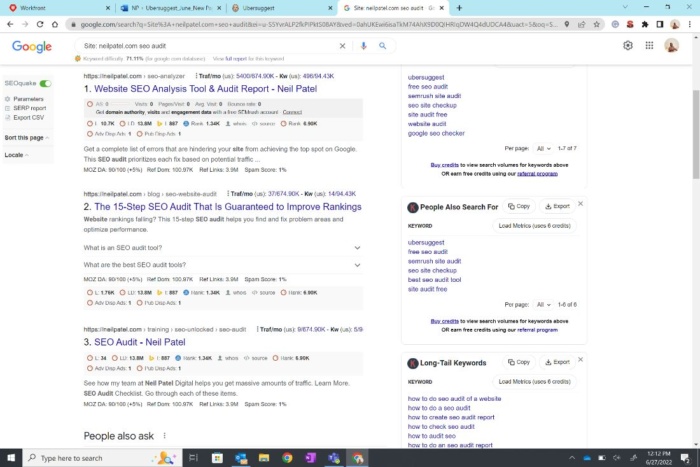
However, I have another advanced keyword research tool you can put to the test.
Building a Content Strategy With Ubersuggest: Step-by-Step
Remember: we’re trying to get comprehensive data for your SEO keyword strategy.
The data reveals the topic’s importance to your audience. This way your content can successfully convert based on the keyword and spark further topic ideas.
To do so, it is best we use a keyword research tool to prevent cannibalization.
Using a keyword research tool like Ubersuggest will simplify things for you. All from one dashboard, you’ll be able to organize your effort to find keyword cannibalization quickly and spot competing pages on your site.
Let’s assess this from a clear overview of risk management for keyword cannibalization:
Scout Competitor Strategies
To optimize your online presence, conduct a competitor analysis. See where your competitors are ranking and aim to outrank them. Capitalize on an angle they missed for an opportunity to perform against their keywords.
So, let’s put Academy into Ubersuggest and see what keywords their competitors are ranking for.
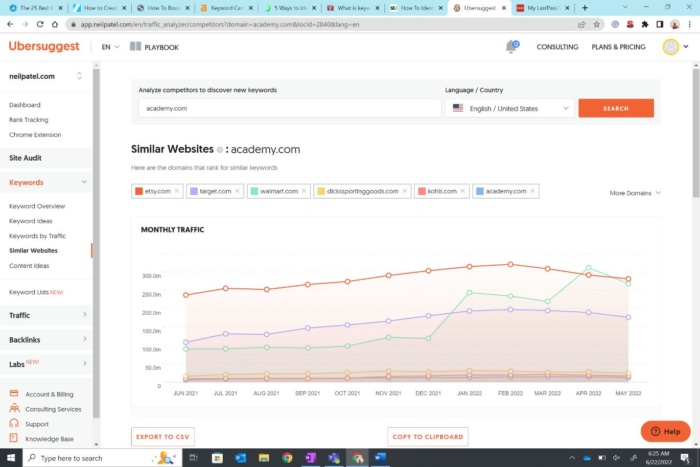
We can now see the similar domains to Academy as well as their monthly traffic for the past year. If we scroll through the results, we can see Walmart is in the top ranking of all the competitors with similar domains.
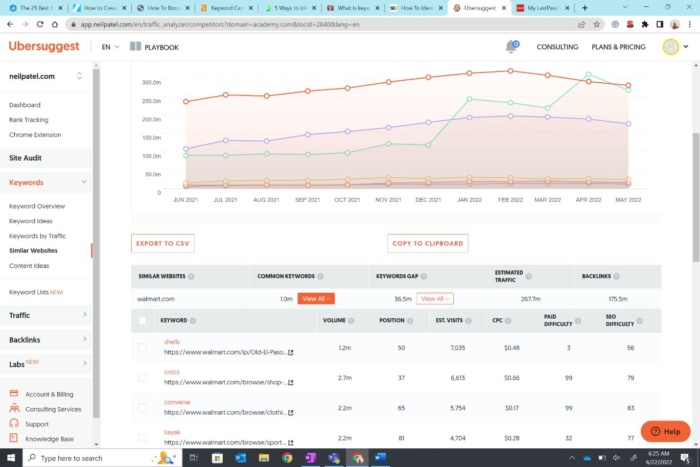
From this data, Academy can review the keyword ‘kayak’ and a couple others they can apply to their SEO keyword strategy based on what makes sense for their company.
They can conduct a competitive analysis and plan how to outrank Walmart for these keywords. This will make their page authority stronger and get them in front of more customers.
Find Keywords With Strong Search Volume That Are Relevant to Your Audience
Continuing with this search for Academy, look at the relevant keywords for their audience.
Would it make sense to use ‘shells’ as a keyword if you’re Academy, just because Walmart is high ranking for it?
No. Old El Paso taco shells aren’t a product Academy offers and wouldn’t make sense under their umbrella for “sports and outdoors” items.
However, footwear like the keywords ‘Crocs’ and ‘Converse’ follow the brand’s product offerings. The keyword ‘kayak’ applies as well, tying to the brand’s distribution of outdoor equipment.
These keywords have a strong search volume, where Academy has the chance to rank higher against competitors.
With Ubersuggest, the approach to content with keywords accurate to your content is a game-changer.
Regularly review the flow of your page URL, SEO title, and meta description to keywords. The analytics will speak for your audience through organic traffic and conversions.
Listen to the analytics. It’ll ultimately show the most valuable content on your site.
Create Solid Content Ideas That Incorporates the Keywords, Not the Other Way Around
Converting copy is the goal.
You’re not writing for readability alone. This is your chance to establish brand credibility.
Solid content copy matches your audience’s search intent with the goals of your keyword strategy. Keeping your content refreshed and orderly seals the package for attractive content delivered to your audience.
You will achieve the results you’re looking for with the help of incorporating aligning keywords.
Content copy in line with the keywords will make it easier for customers to find you. They will use keywords that you satisfy in content-rich pages that describe what they need.
You’ll know your keyword strategy is supporting your marketing strategy when these results materialize.
Build Your SEO Keyword Strategy Around Data From Ubersuggest
Use your data visualizations to guide you.
Build your best SEO keyword strategy on progression you make shown in graphs and other analytics. When you can see your visibility amongst customers, distribution, or even traffic, you can make data-driven decisions.
You don’t have to rely solely on Google for data, either. The Chrome extension for Ubersuggest allows you to get personal with the data. Insights from your backlinks, keywords, and traffic overview reveal new opportunities. With this information tailored to your site, you can get new content and keyword ideas to keep creating unique content.
That’s what really matters with SEO.
Users have reported the detailed charts have allowed them to reposition their rank. They did so by paying attention to keyword search volumes to guide their content creation.
The dashboard can be set based on your preferences and we regularly update to make sure we present the most accurate numbers for you to follow.
We make it easy for you to draw data and refine your keyword strategy.
Create and Establish a Tracking Plan
An effective keyword research tool like Ubersuggest can help you come up with a plan.
Your content relies on your keyword monitoring.
With a tracking plan, you’ll have metrics that show your rankings in search engines in relation to your choice keywords. From this overview of your site’s search engine presence, you can make adjustments where your SEO keyword strategy needs it.
You can group keywords to form topic clusters or content clusters. Grouping the content will help you rank high and have deep-rooted page authority. You can even establish which clusters will have a higher priority within your content.
Make sure your ideation reflects the keywords, so they have purpose in the content.
With our Keyword Lists feature, you can keep up with the progress and success of a keyword set.
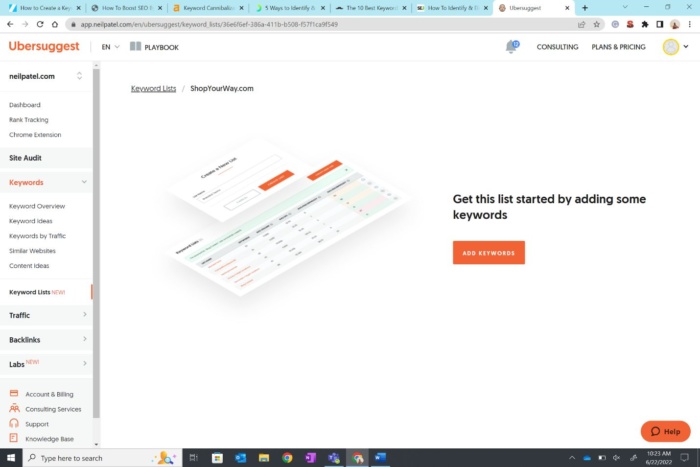
After using our Keyword Ideas feature, come to the Lists section and add in keywords to curate your list.
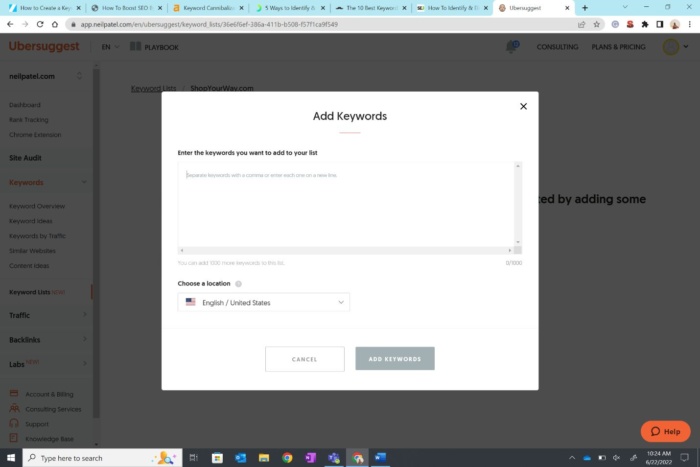
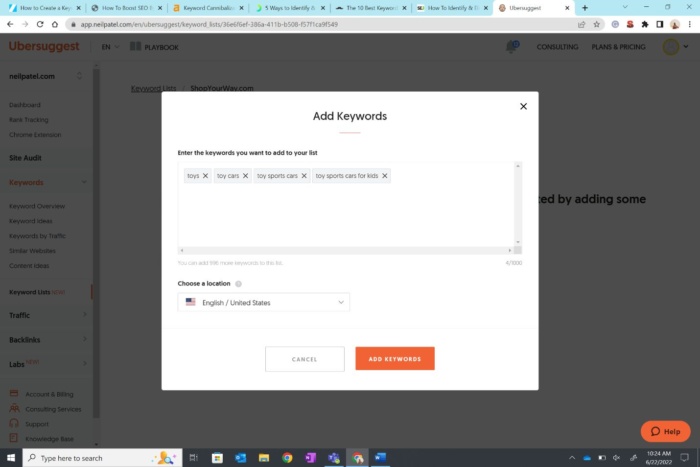
After adding in keywords to your list, let’s look at the results.
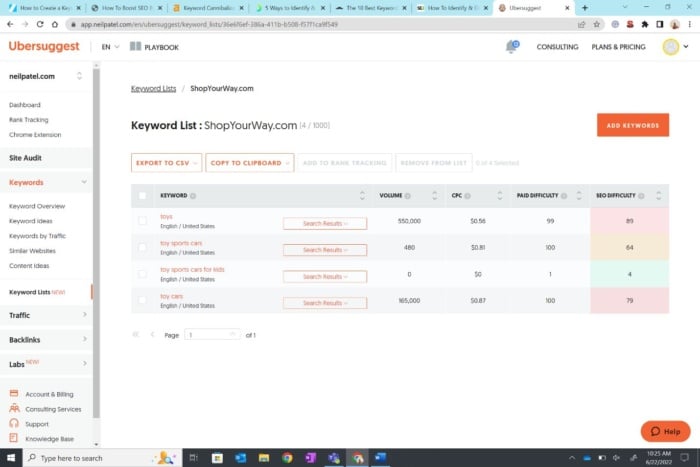
Now, you can see how the keywords input performs in search volume, average cost per click, paid difficulty, and SEO difficulty.
From here, you can establish which keywords will work best for you or reimagine your ideas.
Within your plan, you can even export this data to see how the data changes over time. As things change, you can continue to make adjustments to create a strong keyword strategy.
FAQs
How to avoid keyword cannibalization?
Each of your pages should have unique content. If not, you will struggle with keyword cannibalization. Having a batch of similar keywords and reviewing your backlink opportunities will reveal topics that may have been duplicated. Your SEO keyword strategy can’t help you rank if your content is siphoning traffic from itself. Having relevant content on the page that matches your keywords will help your content convert.
Keyword cannibalization examples
<h3> Keyword cannibalization examples </h3>
Let’s keep it simple: if two pages are targeting the same keyword, the one ranked the highest is “eating” traffic from the content on the other page. For example, if the URL rankings are always changing, it’s because Google is confused about which to rank higher. That fluctuating rank may cause the wrong post to rank higher. The keywords you aimed to rank for may also cause the piece to struggle. Your content must align with user search intent to avoid cannibalization.
How to fix keyword cannibalization?
Start with a search through Google using “Site: YourDomain.com Keyword” to see what information comes up from your site. If there are similar variations using these keywords, you can fix these keywords by combining the content. Additionally, batching all similar keywords in one piece and doing backlink research can curb this situation in the future.
Conclusion
Once you have checked your site for keyword cannibalization, you can get back to driving conversions.
As I mentioned, this concept is a common SEO mistake. However, it’s also something that can be avoided.
Search algorithms are getting smarter every day when assigning ranks. Regularly audit your content to keep your keyword strategy in good shape as things change over time.
I don’t want to see your content falling victim to keyword cannibalization.
That’s why I made Ubersuggest so businesses can be more aware. With the Chrome extension, you can be even better prepared to make pivots at any time.
Using my approach and this keyword research tool, you can rid your site of keyword cannibalization.
Keep your content at the top of the page and constantly converting.
What other steps do you take to avoid keyword cannibalization?

See How My Agency Can Drive Massive Amounts of Traffic to Your Website
- SEO – unlock massive amounts of SEO traffic. See real results.
- Content Marketing – our team creates epic content that will get shared, get links, and attract traffic.
- Paid Media – effective paid strategies with clear ROI.